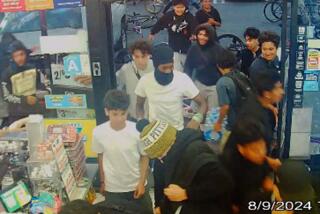7-Eleven Shoppers’ IDs to Be Scanned
- Share via
The next time you walk into a 7-Eleven to buy cigarettes or beer and you look underage, a clerk will probably ask to scan your driver’s license.
A small electronic device will allow clerks to quickly determine whether you’re old enough to make the purchase.
The scanner reads information coded onto a magnetic strip on the back of a driver’s license or state-issued ID, which includes a person’s name, birth date, address, height and weight.
The device, developed by VeriFone Inc., only registers a person’s age and whether a sale of alcohol or tobacco is allowed with prompts such as “OK to purchase alcohol/tobacco” or “denied.”
The scanners should help reduce the number of confrontations between customers and clerks as well as prevent illegal purchases of cigarettes and alcohol, said Margaret Charis, spokeswoman for the Southland Corp., parent company of 7-Eleven stores.
In a busy store with nearly 1,000 to 1,500 customers a day, clerks have to turn away many underage customers.
“People are less likely to argue with a box,” said Charis.
She added that the box does not access motor vehicle records; nor does it create a buying profile of the customer.
“There is no compromise of personal information in using this system. The benefits of this are that our clerks are aided in verifying the age of the customer, and this will also help eliminate mathematical errors,” Charis said.
The scanners could save store owners from federal penalties of up to $1,000 per violation.
Southland spent $250,000 to lease these scanners for all their stores in California.
The new technology comes 10 months after the Food and Drug Administration ordered all tobacco retailers to ask customers who look younger than 27 to produce identification.
The order is the first of a number of sweeping tobacco regulations meant to curb the $1.6 billion teens spend on tobacco products, according to government reports. About 40% of all tobacco purchases made by teens are in convenience stores like 7-Elevens.
“If this is an additional way to verify someone’s identity, then great. But if clerks are scanning the ID without checking, then the machine doesn’t help,” said John Banzhaf, executive director of Action on Smoking and Health, an anti-smoking group.
Jerry Hook, a 7-Eleven marketing manager based in the San Francisco Bay Area, said the company is aware the technology is not foolproof.
“The VeriFone equipment alone cannot guarantee that illegal sales will never be made.” Hook said clerks are also trained in other ways to spot fake IDs.
Southland may use similar technology in the “next-generation cash registers,” which would remind clerks to ask for a driver’s license when alcohol or tobacco products are scanned into the computer.
According to the California Department of Motor Vehicles, 21 million California cards are equipped with the magnetic strip. The DMV began issuing cards with the strips in 1990 to thwart counterfeiters, said Tony Walker, business planning advisor for the DMV.
VeriFone, a company known for developing technology such as phone cards or credit card scanners, was bought by Hewlett-Packard Co. in an April stock swap valued at $1.18 billion. The company developed the “ID box” technology specifically for the 7-Eleven stores.
Dallas-based Southland Corp. has more than 5,000 corporate and franchised stores in the U.S. and Canada.
More to Read
Inside the business of entertainment
The Wide Shot brings you news, analysis and insights on everything from streaming wars to production — and what it all means for the future.
You may occasionally receive promotional content from the Los Angeles Times.










